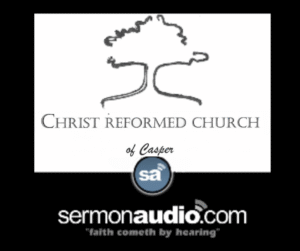LORD’S DAY 38
- What does God require in the fourth commandment?
In the first place, God wills that the ministry of the Gospel and schools be maintained,1 and that I, especially on the day of rest, diligently attend church2 to learn the Word of God,3 to use the holy sacraments,4 to call publicly upon the Lord,5 and to give Christian alms.6 In the second place, that all the days of my life I rest from my evil works, allow the Lord to work in me by His Spirit, and thus begin in this life the everlasting Sabbath.7
[1] Tit. 1:5; 1 Tim. 3:14–15; 4:13–14; 5:17; 1 Cor. 9:11, 13–14. [2] 2 Tim. 2:2, 15; Ps. 40:10–11; 68:26; Acts 2:42, 46. [3] 1 Cor. 14:19, 29, 31. [4] 1 Cor. 11:33. [5] 1 Tim. 2:1–2, 8–10; 1 Cor. 14:16. [6] 1 Cor. 16:2. [7] Isa. 66:23; *Gal. 6:6; *Acts 20:7; Heb. 4:9–10.
Resting in Christ
The Fourth Commandment enjoins on us the observance of the Sabbath day. The word “Sabbath” means “rest.” In the Mosaic administration, this commandment’s observance was clearly spelled out as the complete cessation of all labor and other productive activities on the seventh day of the week. Attached to this was a complex system of holy days and feast days, also called Sabbaths, such as the Passover and the Feast of Tabernacles. Exodus 31:13 tells us these Sabbaths were given to the peoples as signs. Signs are ceremonies or symbols that point to some spiritual truth, and the passage tells us what the Sabbaths point to—that it is the Lord that sanctifies the people. The Lord makes the people holy and blessed, and not their own efforts, and therefore they can rest in Him. Symbolically they rest one day a week, but in truth they were to rest in the salvation of God every day of the week, every minute of their lives, for the Lord does not sanctify them only on the seventh day.
The promised Messiah was the way that God had always promised to purify and perfect His people, to save them from the curse of sin. The Sabbath commandment was therefore a promise of the Messiah, and a heartfelt observation of the Sabbath Day was therefore an act of faith in the Messiah.
In the New Testament, the ceremonies of the Old Law are abrogated. Paul specifically tells Christians (in Romans 14:1-6, Colossians 2:16, and Galatians 4:10) that the observance of a Sabbath day is no longer obligatory for Christians. Some modern proponents of Sabbath observance claim that this is referring only to Jewish feast days, but there is no exegetical reason, no indication from the text, that this is the case. Two of the passages in Romans and Galatians do not refer to Sabbaths specifically but simply to the observance of days of any kind, and Colossians 2:16 uses the same word used for the one-in-seven observance as every other passage in the New Testament.
But this does not mean that the Fourth Commandment is no longer applicable. The Catechism in question 104 gives us the ongoing significance of the commandment. First, we are to lay hold of the means of grace at the appointed times. The Sabbath Day in the Old Testament was the foundation of the whole system of worship given to Israel in the Old Testament. Though the system of worship has changed, the principle has not. The observance of God’s means of grace is mandatory, just as much in the New Testament as in the Old. When at the church’s appointment God’s people are called together to call upon the Lord, take the sacraments and learn God’s word, God’s people are to be there. Barring illness or travel or something of that nature, the worship of God is not optional. If the means of grace are mandated in the Fourth Commandment, then so too is the support of those means. So we are to financially support the church and the training of men to do the work. This is the Catechism’s exhortation that “the ministry of the gospel and the schools be maintained.”
Second, the spiritual heart of the Commandment remains absolutely unchanged. It is a call for us to believe the Gospel. We are to rest from any dream that we can earn God’s favor or our own blessedness through our works. To that end, we can give up time, throughout the week, for spiritual exercises, for public worship, for private and family devotion. The commandment does not mandate a precise schedule for this, but it mandates it nonetheless. Throughout the week we also are to rest in our hearts, not just in our bodies, in the completed sacrifice of Christ on our behalf, and the Spirit of God which was delivered to us by that sacrifice, knowing that it is God the Lord who sanctifies us and not we ourselves. He does that work of sanctification through Jesus Christ.
Jesus, the last week of His life, labored faithfully six days in Jerusalem, teaching and healing as His Father had given Him to do. That work was finished with His greatest obedience of all, on the sixth day, when He died on the cross. On the seventh day He rested, in the grave, in Paradise, the most perfect Sabbath rest any man had ever experienced. And on the eighth day He rose again. So the ancient church appointed the eighth day, the first day of the week, as the day of worship, signaling not the moving of the Sabbath Day from one day to another but the completion and transcendence of the Sabbath system, as was prophesied by the ceremonial system of the Old Testament. The Feast of Tabernacles which looked forward to the salvation of the world, concluded on the eighth day with a final great sacrifice. A child was sanctified to the Lord by circumcision on the eighth day after he was born. The Year of Jubilee was always the fiftieth year, the year after seven Sabbath years, and that was the great year of salvation which Jesus claimed was fulfilled by Him in Luke 4:21. So this eighth day worship, worship on the day when Jesus rose from the dead and fulfilled the law perfectly, the day after the Sabbath, became the rule of the early church and remains so to this day.
So the Catechism does not enjoin on us the observance of any particular day, but calls us to observe the heart of the commandment by laying hold of the means of grace in faith, and trusting in Christ’s power, worked by the Spirit of God, to deliver all the blessings of God to His people. He has perfectly fulfilled all the Law on our behalf, and we receive all the blessings of His kingdom by faith, and thus begin even now to experience eternal rest in Christ by faith.


Comments are closed, but trackbacks and pingbacks are open.